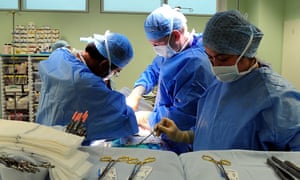Number of Cosmetic Surgery conducted in UK had drop down to 40% in 2016
Analysts say a storm of influence of ‘relatable’ social media celebrities could be behind the downfall in demand.
Fashion and entertainment commentators have said that the growing of an influence of a wave of social media celebrities, including the beauty vlogger Zoella and the model Iskra Lawrence, might be the factor of the drop in demand.
For the first time in nearly 10 years of relatively consistent
growth, the number of cosmetic surgical conducted for female and male
combined had come below 31,000 – with 2016’s number 5% lesser than in 2007.
The BAAPS said the cause is the financial constraints but fashion
and celebrity observers said social media savvy presenters and models
were shifting the focus away from appearances to “relatability”.
Meanwhile, the previous generation of models, popstars and reality TV stars had turned their backs on cosmetic surgery, with Katie Price, as an example, having earlier surgery reversed.
The writer and former model Natasha Devon,
a co-founder of Self-Esteem Team, an organization that focus in schools
and colleges across the UK giving classes on mental health and body
image, had said the occurence corresponded with the rising influence of social
media on fashion. “When I was modelling more than 15 years ago, the
casting director gave a very clear idea of what they wanted before you
walked into the room: you were a prop in their vision and invariably
that meant conforming to a very slim beauty ideal,” she said.
“Now, the models who get booked are the ones with the biggest Instagram follower. Demandingly, these are people who represent a
broader range of shapes, sizes, ages and races. In turn, this
representation of diversity has, I believe, gave people
feeling more comfortable in their own skin.”
In a fall of 39.9% from 2015, 30,750 surgery were conducted on male and female last year: 28,341 surgery on female, down 39.1%; and
2,409 on male, a fall of 47.8%.
Nadia Mendoza, an entertainment journalist and co-founder of the
Self-Esteem Team, said social media celebrities such as Zoella were making
the agenda. “With the web, the vloggers and ‘Insta-famous’
have risen to the surface, and instead of trading on their figures they trade
on relatability,” she said. “This means people like Zoella, Grace
Victory and Iskra Lawrence become the aspirational ones.
“Meanwhile, those who have had the procedure, such as Victoria Beckham and
Katie Price, have now had their implants taken out, which gave out a
powerful message to fans. While people like Danielle Lloyd and Alicia
Douvall still went on to Botched Up Bodies to educate on the horrors of how surgery
can go wrong.
“The rise in Botox, teeth whitening, tanning, contouring etc also means there are a lot more selection rather than having to go cosmetic surgery.”
However, Mendoza said the statistics were not always the cause for
celebration. “Cosmetic surgery is still openly celebrated among the rich
and famous, including the MTV generation of Geordie Shore and Ex On the
Beach, so I would be aware of this decline isn’t subject to change
as young female and male currently under 18 could still be hoping for taking this surgery
when they reach the right age,” she said.
BAAPS said that, the volume of non-surgical treatments such as facial injectables was still incliningi a steady growth. A consultant plastic surgeon and former BAAPS president, Rajiv Grover, said: “In a climate of global fragility, people will less likely to spend on such alterations and become more conservative, opting for less costly non-surgical procedures such as chemical peels and microdermabrasion, rather than going to more permanent changes.
“Someoperations that have no real non-surgical equivalent such as
abdominoplasty and otoplasty (pinning back prominent ears) are some -to name a few- that changed little, with demand for stomach tucks actually
recording an impressive rise among male.”
The top surgical procedure for female was breast enhancement, which
accounted for 7,732 procedures – drop 20% from the previous year. Top
for male was rhinoplasty, commonly known as a nose job, accounted for 529, drop 35% from 2015.
The biggest down was in the number of browlifts, drop to 71%. The number
of male having abdominoplasty – or a tummy tuck – was up 47% with 172 operations carried out.
The BAAPS president, Simon Withey, said: “The 2016 BAAPS audit explain that at the very least, patients are getting the
message that cosmetic surgery is not a short-cut but a serious
commitment and are as a result carefully evaluating the risks as well as the
benefits surgery may offer.
